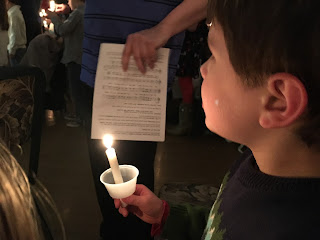Praying for our enemies
Bedtime Theology with the 3 yo...
Me: Who do you want to pray for tonight? Maybe some school friends?
3 yo: Let's pray for Billy (name changed). I like to play with him. I like to do what he does.
Me: Oh that sounds fun.
3 yo: Yeah, he says poopie butt, stinky butt (said in rhythmic chant).
Me: Oh, well, that's not a nice thing to say. Let's not say that.
3 yo: But I want to be like Billy! I like him!
Me: But it isn't a kind and respectful thing to say.
3 yo: But I want to be like Billy! I like him!
This was one of the first moments I realized the enormity of the task of raising a little person in the way of Jesus. Also, that peer pressure starts much earlier than I'd anticipated. This was also one of the first "bedtime theology" conversations I wrote down. I didn't even come up with a very good answer. I might have suggested we pray for little Billy anyway (maybe I did, I can't recall) and that maybe Billy might think of something nicer to say at recess.
That's the tough thing about prayer, though. I generally want to offer God some suggestions for the improvement of others. Have you prayed like this? I have. Dear God, please help my children listen to me, my spouse to come around to my beachy vacation plans, and my colleague to send me fewer irrelevant emails. It's tempting to present a list to God, like a heavenly Santa, and ask if God could pretty please check off a few of them when He gets the chance (because we have been nice).
No prayer is really "bad," per se (I would make the exception of begging God to smite your enemies) because prayer is simply talking to God, and I do think God wants to hear whatever is truly on our hearts. But I think there's a way in which prayer can be at its most transformative, it's most powerful. One of these ways is when we let prayer change us.
Jesus gave two pieces of prayer advice that I want to remember to share with my children, the next time this comes up. First, he said to pray for your enemies. This sounds ridiculous, up front. Why let anyone who has hurt or aggravated me get any more real estate inside my head and heart? But I have tried this myself, and it turns out that even a hasty prayer, said daily, about a person with whom you struggle, offloads the pain and hurt and sadness onto God. I simply didn't have the energy anymore to dislike a person that I prayed for daily. It didn't mean re-engaging with that person. It was more about forgiving and moving on. I think Jesus asks us to pray for our enemies not because they necessarily will change, but because we will.
The other prayer advice I take from Jesus is a line from the Lord's Prayer: Thy will be done. It's deceptively simple, but powerful. It doesn't totally stop me from praying for certain outcomes (I still do, sometimes) but it reminds me that I'm not in control, and that's good. God can use anything and every situation, usually in ways I can't see, to bring about God's kingdom of love and justice on earth. "Thy will be done" is a statement of faith and trust in things we cannot see or forsee.
My prayers with my children still look more like the prayer advice from author Anne Lamott, who suggests that there are really only three kinds of prayer: Help! Thanks! Wow! These are great, too, and easy for children (and grown ups) to remember and comprehend. I know as my children's lives get more complicated, their prayer lives may reflect that, too. They will have more opportunities to pray for their enemies. They will have situations where the best advice I can muster is that they pray "thy will be done." I'm trying to remember these myself. We teach best what we first have practiced.
Note: This conversation occurred on February 1, 2017



We can learn a lot from three year-olds!
ReplyDeleteSo true, Jamie :)
Delete